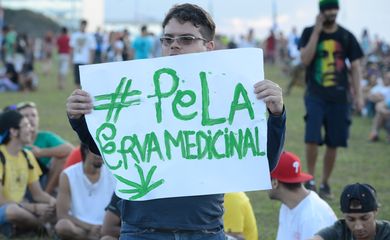Brazil considers reclassifying cannabidiol as medication


In the view of Professor Elisaldo Carlini, from the Federal University of São Paulo, the positive effect of cannabidiol has been known for at least 20 years in countries like the US, Canada and the UK.

The Brazilian Health Surveillance Agency (Anvisa) is considering reclassifying cannabidiol as a medicine. Anvisa acting President Ivo Bucaresky said that the studies conducted by the agency show that “there is no evidence in [scientific] literature that it leads to addiction or to people 'getting stoned'.” Cannabidiol is a substance found in leaves of marijuana (Cannabis sativa), used in the treatment of neurological diseases, cancer, Parkinson's disease, among others.
“Cannabidiol was included on List E, which is the list of plants that can produce narcotic and psychotropic substances, and on List F, with substances outlawed in Brazil. In case it is reclassified, it goes to List C1, with controlled medicines,” Bucaresky said. Reclassification will make it easier for the substance to be imported by legal persons and used in research.
Since April this year, Anvisa has received over 200 requests for imported cannabidiol, of which 184 were granted, while the rest is pending analysis. According to Bucaresky, rejections have been issued within a period of nine days. Brazilian law forbids the importation of cannabidiol, but after a family was granted the right to buy it from overseas by a court ruling, Anvisa started to allow its importation after an individual case analysis.

“Why is it so hard [in Brazil] to obtain a medication that has been produced at laboratories in several countries for 20 years?” questioned the professor Carlini)
Researchers advocate the reclassification of cannabidiol by Anvisa, arguing that the medicine may exert positive effects on patients suffering from autism, multiple sclerosis, neuropathic pain, cancer, epilepsy, and Parkinson's disease, and does not lead to psychoactive effects or addiction. “Reclassifying cannabidiol, depriving it from its prohibited status, is crucial,” says Renato Malcher, professor at the University of Brasília.
In the view of Professor Elisaldo Carlini, from the Federal University of São Paulo, the positive effect of cannabidiol has been known for at least 20 years in countries like the US, Canada and the UK. “Why is it so hard [in Brazil] to obtain a medication that has been produced at laboratories in several countries for 20 years?” questioned the professor, who was twice Anvisa's chairman and still did not manage to legalize cannabidiol “due to the pressure” he encountered then.
According to Carlini, the prohibition of cannabidiol has hindered scientific research in Brazil—a fact acknowledged by Anvisa's current president, who said that lack of research interferes with the use of cannabidiol in many types of treatment. “People don't know the right dose, so they have to run several tests,” he explained.
Translated by Fabrício Ferreira
Fonte: Brazil considers reclassifying cannabidiol as medication


